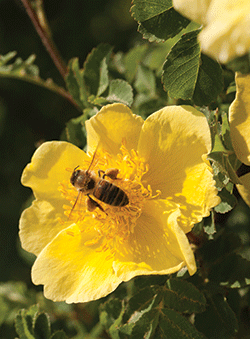The HTA re-stated its support this week for Defra’s National Pollinator Initiative and its commitment to researching pollinator healthin the light of the current EU ban on neonicotinoids.
The EU announced a ban on cetain products containing imidacloprid, thiamethoxam and clothianidin in 2013, due to concerns about their potential impacts on bees. The UK government said at the time they did not consider the scientific evidence to be adequate to justify the ban.
In a statement to members this week, the HTA said neonicotinoids had been widely adopted because of their effectiveness in treating insect pests and their favourable human and environmental safety profile, especially when compared to the older products they replaced. “They play a critical role in modern integrated pest management programs by targeting specific pests while helping to preserve beneficial insects. With hundreds of studies conducted, we know more about neonicotinoids and bees than about any other class of insecticide,” the statement added.
 A number of neonicotinoid products believed to pose little or no harm to beneficial insects or bees are still available for amateur sale including Multirose, Provado, Bug Clear and Rose Clear. “At present, it remains legal to continue to sell these products,” the HTA continued. “These products have been fully assessed, rigorously tested and carry very clear instructions for safe application. Customers may ask about their safety and the danger to bees and there is currently insufficient scientific evidence to form a clear informed opinion on this.”
A number of neonicotinoid products believed to pose little or no harm to beneficial insects or bees are still available for amateur sale including Multirose, Provado, Bug Clear and Rose Clear. “At present, it remains legal to continue to sell these products,” the HTA continued. “These products have been fully assessed, rigorously tested and carry very clear instructions for safe application. Customers may ask about their safety and the danger to bees and there is currently insufficient scientific evidence to form a clear informed opinion on this.”
The HTA, NFU and RHS - all active supporters of the National Pollinator Strategy –acknowledge the need for more research to be carried out, including research into alternatives to neonicotinoids.
“The HTA will continue to fully support the work and aims of the National Pollinator Initiative and the commitment to researching the science behind neonicotinoids and pollinator health. More work remains to be done on wider environmental causes of bee decline and research into alternative controls to limit the damage currently being suffered by growers,” said the HTA’s message.
The EU’s review of the evidence is due to start towards the end of May 2015.
The European Commission’s original proposal included an exemption to allow treatments on bee-attractive crops in greenhouses after flowering. The HTA say they will continue to argue for a full exemption for ornamental horticulture for autumn treatments as well.
Information: click this link
Footnote: Bayer CropScience has received a formal notification that its granular insecticide Merit® Turf for professional users is to be withdrawn. The product contains a neoniotinoid (imidacloprid) covered by the EU’s current ban.
Formal notification of the revocation has been published on the CRD (Chemicals Regulation Directorate) website. During the re-approval process for the existing Merit® Turf authorization, the criteria for approval was changed, resulting in revocation of the approval. Bayer says it is working closely with CRD to collate the data required to meet the revised criteria in time for the 2017 season.
Meanwhile, the manufacturer and the distributor will have a six-month period in which to sell out stock of Merit Turf®. End users will have a further 12 months (until the end of 2016) in which to use them up.